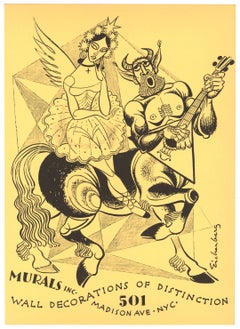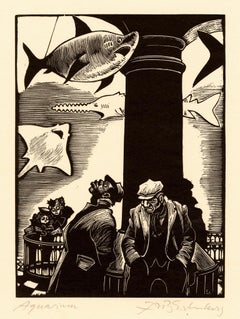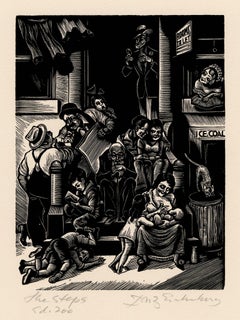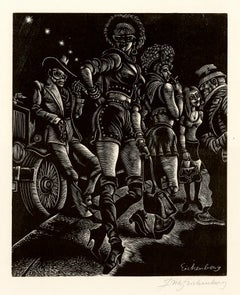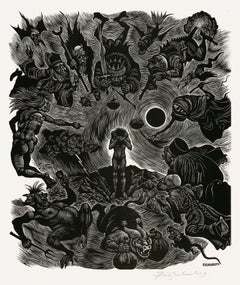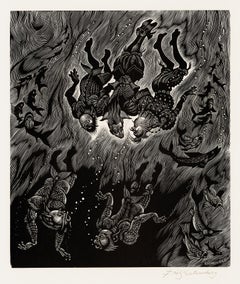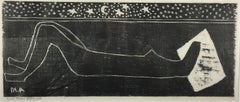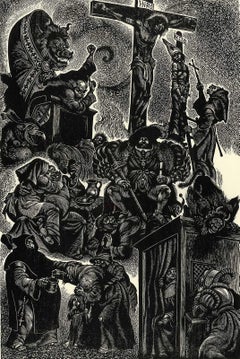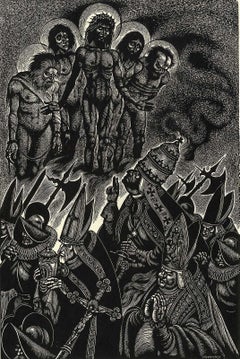Fritz Eichenberg. Prints and Multiples
American, German, 1901-1990
Fritz Eichenberg was one of the world's most sought-after illustrators of literary classics, including The Brothers Karamazov and Crime and Punishment, as well as works by Edgar Allan Poe, Dylan Thomas, the Brontë sisters, and others. Born in Cologne, Germany in 1901, he learned lithography, wood-engraving, and etching and by his early twenties had produced masterful illustrations for Gulliver's Travels and Till Eulenspiegel. He came to the United States in 1933 and over the next five decades produced an astonishing range of individual images and book illustrations. Throughout his life, he was preoccupied with the tragedy of war. He became a close friend and great supporter of Dorothy Day and The Catholic Worker and used his art to express his hope for more justice in the world. (Biography provided by Stone and Press Gallery)
to
3
12
12
12
Overall Height
to
Overall Width
to
11
11
9
6
4
4
2
2
2
2
1
1
1
1
1
12
3
1
3
1
12
986
695
659
626
7
4
3
1
1
Artist: Fritz Eichenberg.
original lithograph
By Fritz Eichenberg
Located in Henderson, NV
Medium: original lithograph. This lithograph was printed in 1953 for the "Improvisations" portfolio, published by the Artists Equity Association of New York on the occasion of the 19...
Category
1950s Fritz Eichenberg. Prints and Multiples
Materials
Lithograph
'The Aquarium' — WPA Era 1930s Graphic Modernism
By Fritz Eichenberg
Located in Myrtle Beach, SC
Fritz Eichenberg, 'The Aquarium', wood engraving, 1933, edition 200. Signed and titled in pencil. Initialed in the block, lower right. A superb, richly-inked impression, on pale yel...
Category
1930s American Modern Fritz Eichenberg. Prints and Multiples
Materials
Woodcut
'The Steps' — WPA Era 1930s Graphic Modernism
By Fritz Eichenberg
Located in Myrtle Beach, SC
Fritz Eichenberg, 'The Steps', wood engraving, 1933, edition 200. Signed, titled, and annotated 'Ed. 200' in pencil. Initialed in the block, lower right. A superb, richly-inked impr...
Category
1930s American Modern Fritz Eichenberg. Prints and Multiples
Materials
Woodcut
'The Pimp' — Graphic Modernism
By Fritz Eichenberg
Located in Myrtle Beach, SC
Fritz Eichenberg, 'The Pimp', wood engraving, 1980, artist's proof before the edition. Signed in pencil. Signed in the block, lower right. A fine, richly-inked impression, on cream wove paper, with full margins (2 3/16 to 3 1/2 inches), in excellent condition. Archivally sleeved, unmatted.
Image size 12 x 9 3/4 inches (305 x 248 mm); sheet size 18 x 14 inches (457 x 356 mm).
ABOUT THE ARTIST
Fritz Eichenberg (1901–1990) was a German-American illustrator and arts educator who worked primarily in wood engraving. His best-known works were concerned with religion, social justice, and nonviolence.
Eichenberg was born to a Jewish family in Cologne, Germany, where the destruction of World War I helped to shape his anti-war sentiments. He worked as a printer's apprentice and studied at the Municipal School of Applied Arts in Cologne and the Academy of Graphic Arts in Leipzig, where he studied under Hugo Steiner-Prag. In 1923 he moved to Berlin to begin his career as an artist, producing illustrations for books and newspapers. In his newspaper and magazine work, Eichenberg was politically outspoken and sometimes wrote and illustrated his reporting.
In 1933, the rise of Adolf Hitler drove Eichenberg, who was a public critic of the Nazis, to emigrate with his wife and children to the United States. He settled in New York City, where he lived most of his life. He worked in the WPA Federal Arts Project and was a member of the Society of American Graphic Artists.
In his prolific career as a book illustrator, Eichenberg portrayed many forms of literature but specialized in works with elements of extreme spiritual and emotional conflict, fantasy, or social satire. Over his long career, Eichenberg was commissioned to illustrate more than 100 classics by publishers in the United States and abroad, including works by renowned authors Dostoyevsky, Tolstoy, Charlotte and Emily Brontë, Poe, Swift, and Grimmelshausen. He also wrote and illustrated books of folklore and children's stories.
Eichenberg was a long-time contributor to the progressive magazine The Nation, his illustrations appearing between 1930 and 1980. Eichenberg’s work has been featured by such esteemed publishers as The Heritage Club, Random House, Book of the Month Club, The Limited Editions Club, Kingsport Press, Aquarius Press, and Doubleday.
Raised in a non-religious family, Eichenberg had been attracted to Taoism as a child. Following his wife's unexpected death in 1937, he turned briefly to Zen Buddhist meditation, then joined the Religious Society of Friends in 1940. Though he remained a Quaker until his death, Eichenberg was also associated with Catholic charity work through his friendship with Dorothy Day...
Category
1980s American Modern Fritz Eichenberg. Prints and Multiples
Materials
Woodcut
'Simplicius' Farewell to the World' — Graphic Modernism
By Fritz Eichenberg
Located in Myrtle Beach, SC
Fritz Eichenberg, 'Simplicius’ Farewell To The World' from the suite 'The Adventurous Simplicissimus', wood engraving, 1977, artist's proof apart from the edition of 50. Signed in pencil. Signed in the block, lower right. A fine, richly-inked impression, on cream wove paper, with full margins (1 1/2 to 2 inches), in excellent condition. Image size 14 x 12 inches (356 x 305 mm); sheet size 17 1/2 x 15 inches (445 x 381 mm). Archivally sleeved, unmatted.
ABOUT THIS WORK
'Simplicius Simplicissimus' (German: Der abenteuerliche Simplicissimus Teutsch) is a picaresque novel of the lower Baroque style, written in five books by Hans Jakob Christoffel von Grimmelshausen published in 1668, with the sequel Continuatio appearing in 1669.
The novel is told from the perspective of its protagonist Simplicius, a rogue or picaro typical of the picaresque novel, as he traverses the tumultuous world of the Holy Roman Empire during the Thirty Years' War. Raised by a peasant family, he is separated from his home by foraging dragoons. He is adopted by a hermit living in the forest, who teaches him to read and introduces him to religion. The hermit also gives Simplicius his name because he is so simple that he does not know his own name. After the death of the hermit, Simplicius must fend for himself. He is conscripted at a young age into service and, from there, embarks on years of foraging, military triumph, wealth, prostitution, disease, bourgeois domestic life, and travels to Russia, France, and an alternate world inhabited by mermen. The novel ends with Simplicius turning to a life of hermitage, denouncing the world as corrupt.
ABOUT THE ARTIST
Fritz Eichenberg (1901–1990) was a German-American illustrator and arts educator who worked primarily in wood engraving. His best-known works were concerned with religion, social justice, and nonviolence.
Eichenberg was born to a Jewish family in Cologne, Germany, where the destruction of World War I helped to shape his anti-war sentiments. He worked as a printer's apprentice and studied at the Municipal School of Applied Arts in Cologne and the Academy of Graphic Arts in Leipzig, where he studied under Hugo Steiner-Prag. In 1923 he moved to Berlin to begin his career as an artist, producing illustrations for books and newspapers. In his newspaper and magazine work, Eichenberg was politically outspoken and sometimes wrote and illustrated his reporting.
In 1933, the rise of Adolf Hitler drove Eichenberg, who was a public critic of the Nazis, to emigrate with his wife and children to the United States. He settled in New York City, where he lived most of his life. He worked in the WPA Federal Arts Project and was a member of the Society of American Graphic Artists.
In his prolific career as a book illustrator, Eichenberg portrayed many forms of literature but specialized in works with elements of extreme spiritual and emotional conflict, fantasy, or social satire. Over his long career, Eichenberg was commissioned to illustrate more than 100 classics by publishers in the United States and abroad, including works by renowned authors Dostoyevsky, Tolstoy, Charlotte and Emily Brontë, Poe, Swift, and Grimmelshausen. He also wrote and illustrated books of folklore and children's stories.
Eichenberg was a long-time contributor to the progressive magazine The Nation, his illustrations appearing between 1930 and 1980. Eichenberg’s work has been featured by such esteemed publishers as The Heritage Club, Random House, Book of the Month Club, The Limited Editions Club, Kingsport Press, Aquarius Press, and Doubleday.
Raised in a non-religious family, Eichenberg had been attracted to Taoism as a child. Following his wife's unexpected death in 1937, he turned briefly to Zen Buddhist meditation, then joined the Religious Society of Friends in 1940. Though he remained a Quaker until his death, Eichenberg was also associated with Catholic charity work through his friendship with Dorothy Day...
Category
1970s American Modern Fritz Eichenberg. Prints and Multiples
Materials
Woodcut
'A Visit to the King of the Waters' — Graphic Modernism
By Fritz Eichenberg
Located in Myrtle Beach, SC
Fritz Eichenberg, 'A Visit to the King of the Waters' from the suite 'The Adventurous Simplicissimus', wood engraving, 1977, artist's proof apart from the edition of 50. Signed in pencil. Signed in the block, lower right. A fine, richly-inked impression, on cream wove paper, with full margins (1 1/2 to 2 inches), in excellent condition. Image size 14 x 12 inches (356 x 305 mm); sheet size 17 1/2 x 15 inches (445 x 381 mm). Archivally sleeved, unmatted.
ABOUT THIS WORK
'Simplicius Simplicissimus' (German: Der abenteuerliche Simplicissimus Teutsch) is a picaresque novel of the lower Baroque style, written in five books by Hans Jakob Christoffel von Grimmelshausen published in 1668, with the sequel Continuatio appearing in 1669.
The novel is told from the perspective of its protagonist Simplicius, a rogue or picaro typical of the picaresque novel, as he traverses the tumultuous world of the Holy Roman Empire during the Thirty Years' War. Raised by a peasant family, he is separated from his home by foraging dragoons. He is adopted by a hermit living in the forest, who teaches him to read and introduces him to religion. The hermit also gives Simplicius his name because he is so simple that he does not know his own name. After the death of the hermit, Simplicius must fend for himself. He is conscripted at a young age into service and, from there, embarks on years of foraging, military triumph, wealth, prostitution, disease, bourgeois domestic life, and travels to Russia, France, and an alternate world inhabited by mermen. The novel ends with Simplicius turning to a life of hermitage, denouncing the world as corrupt.
ABOUT THE ARTIST
Fritz Eichenberg (1901–1990) was a German-American illustrator and arts educator who worked primarily in wood engraving. His best-known works were concerned with religion, social justice, and nonviolence.
Eichenberg was born to a Jewish family in Cologne, Germany, where the destruction of World War I helped to shape his anti-war sentiments. He worked as a printer's apprentice and studied at the Municipal School of Applied Arts in Cologne and the Academy of Graphic Arts in Leipzig, where he studied under Hugo Steiner-Prag. In 1923 he moved to Berlin to begin his career as an artist, producing illustrations for books and newspapers. In his newspaper and magazine work, Eichenberg was politically outspoken and sometimes wrote and illustrated his reporting.
In 1933, the rise of Adolf Hitler drove Eichenberg, who was a public critic of the Nazis, to emigrate with his wife and children to the United States. He settled in New York City, where he lived most of his life. He worked in the WPA Federal Arts Project and was a member of the Society of American Graphic Artists.
In his prolific career as a book illustrator, Eichenberg portrayed many forms of literature but specialized in works with elements of extreme spiritual and emotional conflict, fantasy, or social satire. Over his long career, Eichenberg was commissioned to illustrate more than 100 classics by publishers in the United States and abroad, including works by renowned authors Dostoyevsky, Tolstoy, Charlotte and Emily Brontë, Poe, Swift, and Grimmelshausen. He also wrote and illustrated books of folklore and children's stories.
Eichenberg was a long-time contributor to the progressive magazine The Nation, his illustrations appearing between 1930 and 1980. Eichenberg’s work has been featured by such esteemed publishers as The Heritage Club, Random House, Book of the Month Club, The Limited Editions Club, Kingsport Press, Aquarius Press, and Doubleday.
Raised in a non-religious family, Eichenberg had been attracted to Taoism as a child. Following his wife's unexpected death in 1937, he turned briefly to Zen Buddhist meditation, then joined the Religious Society of Friends in 1940. Though he remained a Quaker until his death, Eichenberg was also associated with Catholic charity work through his friendship with Dorothy Day...
Category
1970s American Modern Fritz Eichenberg. Prints and Multiples
Materials
Woodcut
'The Wolf and the Little Kids' — Graphic Modernism
By Fritz Eichenberg
Located in Myrtle Beach, SC
Fritz Eichenberg, 'The Wolf and the Little Kids' from the suite 'Fables with a Twist', wood engraving, 1975-76, artist's proof apart from the edition of c. 50. Signed, titled, and annotated 'Artist’s Proof' in pencil. Signed in the block, lower right. A fine, richly-inked impression, on cream wove paper, with full margins (7/8 to 1 1/2 inches), in excellent condition. Complete with vellum folder with descriptive text in red and black linotype. Printed by master printer Harold McGrath at The Gehenna Press, Northampton, MA. Image size 13 15/16 x 12 1/8 inches (354 x 308 mm); sheet size 16 1/2 x 14 inches (419 x 356 mm). Archivally sleeved, unmatted.
Collection: Harvard Museums.
ABOUT THE ARTIST
Fritz Eichenberg (1901–1990) was a German-American illustrator and arts educator who worked primarily in wood engraving. His best-known works were concerned with religion, social justice, and nonviolence.
Eichenberg was born to a Jewish family in Cologne, Germany, where the destruction of World War I helped to shape his anti-war sentiments. He worked as a printer's apprentice and studied at the Municipal School of Applied Arts in Cologne and the Academy of Graphic Arts in Leipzig, where he studied under Hugo Steiner-Prag. In 1923 he moved to Berlin to begin his career as an artist, producing illustrations for books and newspapers. In his newspaper and magazine work, Eichenberg was politically outspoken and sometimes wrote and illustrated his reporting.
In 1933, the rise of Adolf Hitler drove Eichenberg, who was a public critic of the Nazis, to emigrate with his wife and children to the United States. He settled in New York City, where he lived most of his life. He worked in the WPA Federal Arts Project and was a member of the Society of American Graphic Artists.
In his prolific career as a book illustrator, Eichenberg portrayed many forms of literature but specialized in works with elements of extreme spiritual and emotional conflict, fantasy, or social satire. Over his long career, Eichenberg was commissioned to illustrate more than 100 classics by publishers in the United States and abroad, including works by renowned authors Dostoyevsky, Tolstoy, Charlotte and Emily Brontë, Poe, Swift, and Grimmelshausen. He also wrote and illustrated books of folklore and children's stories.
Eichenberg was a long-time contributor to the progressive magazine The Nation, his illustrations appearing between 1930 and 1980. Eichenberg’s work has been featured by such esteemed publishers as The Heritage Club, Random House, Book of the Month Club, The Limited Editions Club, Kingsport Press, Aquarius Press, and Doubleday.
Raised in a non-religious family, Eichenberg had been attracted to Taoism as a child. Following his wife's unexpected death in 1937, he turned briefly to Zen Buddhist meditation, then joined the Religious Society of Friends in 1940. Though he remained a Quaker until his death, Eichenberg was also associated with Catholic charity work through his friendship with Dorothy Day...
Category
1970s American Modern Fritz Eichenberg. Prints and Multiples
Materials
Woodcut
'City Lights' — Vintage Wood Engraving, New York City, 1934
By Fritz Eichenberg
Located in Myrtle Beach, SC
Fritz Eichenberg, 'City LIghts', wood engraving, 1934, edition 200. Signed, titled 'Lights', and annotated 'No 2/200 for Howard M. Chapin' in pencil. Initialed in the block, lower right. A fine, richly-inked black impression, on cream wove paper, with full margins (1 1/4 to 1 7/8 inches); a small loss (5/8 inch) in the top right sheet corner, well away from the image, otherwise in excellent condition. Printed by master printer Ernest Roth...
Category
1930s American Modern Fritz Eichenberg. Prints and Multiples
Materials
Woodcut
Mlle. Celine and Escort (Celine is a dancer former mistress of Mister Rochester)
By Fritz Eichenberg
Located in New Orleans, LA
Fritz Eichenberg did some original wood engravings for "Jane Eyre." Céline Varens was Adèle's mother and Mr. Rochester's former mistress. A French opera dancer, Céline pretended to ...
Category
Late 20th Century American Modern Fritz Eichenberg. Prints and Multiples
Materials
Wood, Engraving
Follies of Princely Power (A chess match as a metaphor for warfare)
By Fritz Eichenberg
Located in New Orleans, LA
Fritz Eichenberg created ten wood engravings to illustrate 'The Praise of Folly' by Erasmus. This particular image seems to portray the idea that "War, civil society and the arts ar...
Category
Late 20th Century American Modern Fritz Eichenberg. Prints and Multiples
Materials
Engraving, Wood
Georgiana and Eliza (cousins of Jane Eyre)
By Fritz Eichenberg
Located in New Orleans, LA
Fritz Eichenberg did some original wood engravings for Jane Eyre. This is an image featuring Georgiana And Eliza. As children, Eliza and Georgiana Reed, alon...
Category
Late 20th Century American Modern Fritz Eichenberg. Prints and Multiples
Materials
Wood, Engraving
Adele and the Ladies (Rochester's fashion conscious ward in Jane Eyre)
By Fritz Eichenberg
Located in New Orleans, LA
Adele, the 10 year-old girl who may be the daughter of Rochester and Celine in "Jane Eyre" is being scrutinized by three women. One is seated on an ornate sofa...
Category
Early 20th Century American Modern Fritz Eichenberg. Prints and Multiples
Materials
Wool, Engraving
Related Items
NIGHT NUDE
By Milton Avery
Located in Portland, ME
Avery, Milton. NIGHT NUDE. Woodcut, 1953. Edition of 25 in black and white (there were a further 25 printed in black and blue). Signed, dated and numbered "6/25" in pencil, and also ...
Category
1950s American Modern Fritz Eichenberg. Prints and Multiples
Materials
Woodcut
Jean COCTEAU and Raymond MORETTI: Love Encounter - Original Hansigned Lithograph
By Jean Cocteau
Located in Paris, FR
Jean Cocteau and Raymond Moretti
Love Encounter
Original lithograph
Printed signature in the plate, handsigned by Raymond Moretti
Numbered EA 1/10 - Very look for proof bearing n°1
...
Category
1970s Surrealist Fritz Eichenberg. Prints and Multiples
Materials
Lithograph
The Bible : Salomon's Prayer - Original Lithograph
By Marc Chagall
Located in Paris, FR
Marc Chagall (1887-1985)
The Bible, Salomon's Prayer
Original lithography (Mourlot Workshop)
On paper 37 x 26.5 cm (c. 14.5 x 10.2 in)
A second illustration on the back, see photo...
Category
1950s Modern Fritz Eichenberg. Prints and Multiples
Materials
Lithograph
3 Turns - Surfing Art - Figurative Print - Woodcut Print By Marc Zimmerman
By Marc Zimmerman
Located in Carmel, CA
Three surfers carving up the Hawaiian waves, having a blast in the tropical surf.
3 Turns - Surfing Art - Figurative Print - Woodcut Print By Marc Zimmerman
Limited Edition 01/05
...
Category
2010s American Modern Fritz Eichenberg. Prints and Multiples
Materials
Woodcut
Henry Spanner, Beer
Located in New York, NY
This is among the very few prints known by Spanner. It's the epitome of joie de vivre. It is signed, numbered, and annotated 'Hand print,' in pencil. The numbering indicates an edit...
Category
1930s American Modern Fritz Eichenberg. Prints and Multiples
Materials
Woodcut
Modern American Industrial Landscape
Located in Buffalo, NY
An original woodblock print dated 1965, titled "Our Town" but signed illegibly.
Category
1960s American Modern Fritz Eichenberg. Prints and Multiples
Materials
Woodcut, Paper
Dan Burne Jones, Affection
Located in New York, NY
Dan Burne Jones is widely know as the author of the Rockwell Kent print catalogue raisonne. It's so interesting to see that he is a gifted wood engraver as well. Jones's own prints a...
Category
1930s American Modern Fritz Eichenberg. Prints and Multiples
Materials
Woodcut
The Bible : Adam and Eve banished from Paradise - Original Lithograph
By Marc Chagall
Located in Paris, FR
Marc Chagall (1887-1985)
The Bible, Adam and Eve banished from Paradise
Original lithography (Daeger Workshop)
On paper 36 x 26.5 cm (c. 14.2 x 10.2 in)
Second illustration on the...
Category
Mid-20th Century Modern Fritz Eichenberg. Prints and Multiples
Materials
Lithograph
Bathers - Lithograph, 1971
By Paul Cézanne
Located in Paris, FR
Paul Cezanne
Bathers, 1971
Lithograph and stencil (Jacomet workshop)
Unsigned
Numbered / 225
On paper applied on Arches vellum 53.5 x 41.5 cm (c. 21 x 16.5 in)
Image size : 13 x 26 ...
Category
1970s Modern Fritz Eichenberg. Prints and Multiples
Materials
Stencil, Lithograph
The Bible : David and Bethsabee in Love - Original Lithograph (Mourlot)
By Marc Chagall
Located in Paris, FR
Marc Chagall (1887-1985)
The Bible, David and Bethsabée in Love
Original lithography (Mourlot Workshop)
On paper 37 x 26.5 cm (c. 14.5 x 10.2 in)
A second illustration on the back...
Category
1950s Modern Fritz Eichenberg. Prints and Multiples
Materials
Lithograph
The Bible : The Angel of Salvation - Original Lithograph
By Marc Chagall
Located in Paris, FR
Marc Chagall (1887-1985)
The Bible, The Angel of Salvation
Original lithography (Daeger Workshop)
On paper 36 x 26.5 cm (c. 14.5 x 10.2 in)
REFERENCE:
Catalogue raisonné Chagall...
Category
Mid-20th Century Modern Fritz Eichenberg. Prints and Multiples
Materials
Lithograph
Paris : Monceau Park - Original Lithograph, Handsigned
By Robert Savary
Located in Paris, FR
Robert SAVARY
Paris : Monceau Park, 1969
Original lithograph (Mourlot workshop)
Handsigned in pencil
On Arches vellum 37 x 29 cm (c. 16 x 12 in)
Excellent condition
Category
1960s Modern Fritz Eichenberg. Prints and Multiples
Materials
Lithograph
Previously Available Items
Follies of the Monks -- Erasmus
By Fritz Eichenberg
Located in New Orleans, LA
Trouble is not new to the church. Eichenberg illustrated In Praise Of Folly created this image called Folly of the Monks and Erasmus was writing in the 16th century. Erasmus was an...
Category
1970s American Modern Fritz Eichenberg. Prints and Multiples
Materials
Wood, Engraving
Follies of the Popes (1500 to 2019 - Erasmus
By Fritz Eichenberg
Located in New Orleans, LA
Trouble is not new to religion. Eichenberg illustrated In Praise Of Folly and created this image called Folly of the Popes and Erasmus was writing in the 16...
Category
1970s American Modern Fritz Eichenberg. Prints and Multiples
Materials
Wood, Engraving
Folly of Worshipping Idols
By Fritz Eichenberg
Located in New Orleans, LA
Trouble is not new to religion. Eichenberg illustrated In Praise Of Folly and created this image called Folly of Worshipping Idols and Erasmus was writing in the 16th century. Eras...
Category
1970s American Modern Fritz Eichenberg. Prints and Multiples
Materials
Wood, Engraving
Folly of Worshipping Idols
By Fritz Eichenberg
Located in New Orleans, LA
Trouble is not new to religion. Eichenberg illustrated In Praise Of Folly and created this image called Folly of Worshipping Idols and Erasmus was writing in the 16th century. Eras...
Category
1970s American Modern Fritz Eichenberg. Prints and Multiples
Materials
Wood, Engraving
Crime and Punishment
By Fritz Eichenberg
Located in New Orleans, LA
In 1966, Fritz Eichenberg moved to Rhode Island and chaired the Art Department of the University of Rhode Island in Kingston. His wood engravings and lithographs are almost always as...
Category
Late 20th Century American Modern Fritz Eichenberg. Prints and Multiples
Materials
Wood, Engraving
And His Strength Went From Him (Samson And Delilah)
By Fritz Eichenberg
Located in New Orleans, LA
Fritz Eichenberg created wood engravings to illustrate the biblical scene of Samson and Goliath
German born wood engraver and lithographer, Eichenberg studied at the School of Appli...
Category
Late 20th Century American Modern Fritz Eichenberg. Prints and Multiples
Materials
Wood, Engraving
Beethoven (Portrait of German classical composer Ludwig van Beethoven)
By Fritz Eichenberg
Located in New Orleans, LA
Fritz Eichenberg's portrait in wood engraving of Beethoven. Born: December 16, 1770 (baptized: December 17, 1770) - Bonn, Germany
Died: March 26, 1827 - Bonn, Germany
Ludwig van Beethoven...
Category
Late 20th Century American Modern Fritz Eichenberg. Prints and Multiples
Materials
Wood, Engraving
The Rich Man and the Widow
By Fritz Eichenberg
Located in New Orleans, LA
In 1966, Eichenberg moved to Rhode Island and chaired the Art Department of the University of Rhode Island in Kingston. His wood engravings and lithographs are almost always associa...
Category
Late 20th Century American Modern Fritz Eichenberg. Prints and Multiples
Materials
Wood, Engraving
Mrs. Fairfax (Housekeeper at Thornfield Hall in the novel, Jane Eyre)
By Fritz Eichenberg
Located in New Orleans, LA
"Mrs. Fairfax", is a wood engraving of the fictional character of the housekeeper at Thornfield Hall in the novel "Jane Eyre" (1847) by Charlotte Brontë. Mr...
Category
Early 20th Century American Modern Fritz Eichenberg. Prints and Multiples
Materials
Wood, Engraving
Follies of the Courts
By Fritz Eichenberg
Located in New Orleans, LA
Trouble is not new to the courts. Eichenberg illustrated In Praise Of Folly created this image called Folly of the Courts and Erasmus was writing in the 16th century. Erasmus was a...
Category
1970s American Modern Fritz Eichenberg. Prints and Multiples
Materials
Engraving, Wood
Follies of the Monks
By Fritz Eichenberg
Located in New Orleans, LA
Trouble is not new to the church. Eichenberg illustrated In Praise Of Folly created this image called Folly of the Monks and Erasmus was writing in the 16th century. Erasmus was an...
Category
1970s American Modern Fritz Eichenberg. Prints and Multiples
Materials
Wood, Engraving
Follies of Old Age (Humans do not always grow wiser as they age)
By Fritz Eichenberg
Located in New Orleans, LA
Eichenberg turns his attention to Erasmus's withering look at humans as they age Clearly wisdom was not the trait he foundErasmus was an important figure in classical scholarship who...
Category
1970s American Modern Fritz Eichenberg. Prints and Multiples
Materials
Wood, Engraving
Fritz Eichenberg. prints and multiples for sale on 1stDibs.
Find a wide variety of authentic Fritz Eichenberg. prints and multiples available for sale on 1stDibs. You can also browse by medium to find art by Fritz Eichenberg. in woodcut print, engraving, wood and more. Much of the original work by this artist or collective was created during the 20th century and is mostly associated with the modern style. Not every interior allows for large Fritz Eichenberg. prints and multiples, so small editions measuring 4 inches across are available. Customers who are interested in this artist might also find the work of Charles Frederick William Mielatz, Harry Sternberg, and Robert Vale Faro. Fritz Eichenberg. prints and multiples prices can differ depending upon medium, time period and other attributes. On 1stDibs, the price for these items starts at $125 and tops out at $1,800, while the average work can sell for $450.
